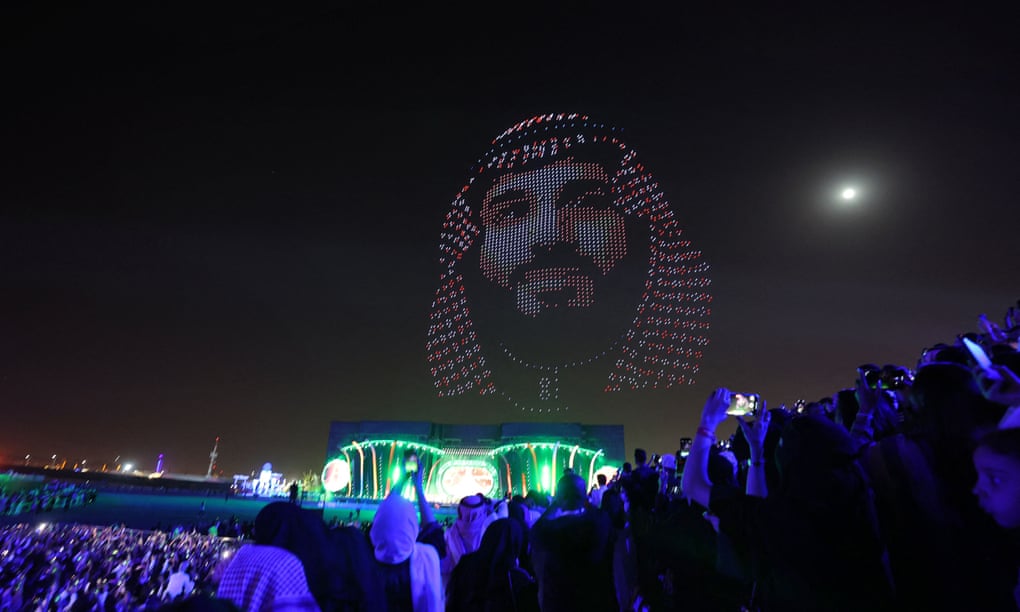Specter of problematic crown prince looms over Biden’s Saudi Arabia policy
The president has snubbed Mohammed bin Salman, but the ruler recently labelled a ‘psychopath’ is a problem that won’t go away
When Joe Biden was recently asked whether gas prices would come down soon, the US president offered a cryptic explanation of how his strained relations with Saudi Arabia were at least partly to blame for the price at the pump.
Gas prices were high because oil-rich nations in the Middle East were not increasing the supply of oil. That was happening, Biden suggested, in retaliation for his personal decision to not speak with – nor acknowledge – Crown Prince Mohammed bin Salman as his counterpart.
“Gas prices relate to a foreign policy initiative that is about something that goes beyond the cost of gas,” Biden said at a town hall meeting on CNN. “There’s a lot of Middle Eastern folks who want to talk to me. I’m not sure I’m going to talk to them.”
Later he added: “There’s a possibility to be able to bring it down, depends a little bit on Saudi Arabia and a few other things that are in the offing.”
The White House has declined to comment further on Biden’s remarks, and did not answer the Guardian’s questions about how the apparent quid pro quo Biden alluded to was communicated to the administration.
But experts in Washington said there was little doubt that Biden’s remarks indicated that Saudi Arabia was demanding more personal attention from the president, despite several high-level meetings in recent weeks between top administration officials and their Saudi counterparts, including a recent trip by Jake Sullivan to meet Prince Mohammed in Riyadh.
The crown prince is probably seeking a phone call similar to one he received from Biden’s predecessor, Donald Trump, in April 2020, when the then president telephoned Prince Mohammed and the Russian president, Vladimir Putin, and called for global deal to cut oil production. In that case, US shale companies had been hit hard by a standoff between Russia and Saudi Arabia, and Trump later boasted that his call helped end the apparent rupture.
The current president’s ongoing snub has reflected a campaign promise by Biden to turn Prince Mohammed’s government into a “pariah” following the grisly murder of the Washington Post journalist Jamal Khashoggi: a vow that he has not kept, apart from his personal avoidance of the prince.
“Would MBS use his leverage on Biden to force the administration to back off their position? I would say the answer is absolutely yes. MBS is notoriously thin-skinned. He chafes under the administration’s position, even though the administration has taken a much more modest approach than people anticipated,” said Gerald Feierstein, the former US ambassador to Yemen.
The US president’s upcoming travels to Europe, including the UN climate change conference in Glasgow, where Prince Mohammed will also appear, has raised questions about whether Biden will acknowledge the de facto ruler of Saudi Arabia, or instead avoid the 36-year-old at all costs.
“I wouldn’t advise meeting MBS,” said Ben Rhodes, the former deputy national security adviser to Barack Obama. “[MBS] is aiming to communicate that there are no consequences to what he did. The normalization of his standing as a de facto head of state is integral to his desire to put the Jamal Khashoggi episode behind him.”
While awkward encounters can sometimes occur on the world stage – from Obama’s stare down with Putin in 2014 to the former president’s regrettable handshakes with Muammar Gaddafi and Hugo Chávez – there are ways to try to avoid such encounters, Rhodes said.
“At a minimum, you avoid a bilateral meeting. But I’ve been in circumstances where the president didn’t want to be photographed shaking someone’s hand, for instance. You have Secret Service [to shield the president] and you can communicate that you want to avoid an encounter,” Rhodes said.
Bruce Riedel at the Brookings Institution, a Saudi expert and former CIA analyst, said Biden can expect Prince Mohammed will aggressively seek out a handshake if the two find themselves in close proximity.
“I think he should go a lot further than not talking to him,” Riedel said.
Experts agreed that the real issue was not whether Biden might face an embarrassing “gotcha” moment with a prince who was recently called a “psychopath” by a former high-ranking Saudi intelligence official, and who US intelligence agencies have said authorised the killing of Khashoggi. Instead, the question reflects a broader debate within the administration about how to deal with “MBS”.
“Can you continue to say we are not going to deal with the crown prince? My own view is that even if you can at the moment, it doesn’t make any sense over the longer term. Because sooner or later, MBS is going to be king, and at that point they will have to deal with him as head of state,” said Feierstein.


